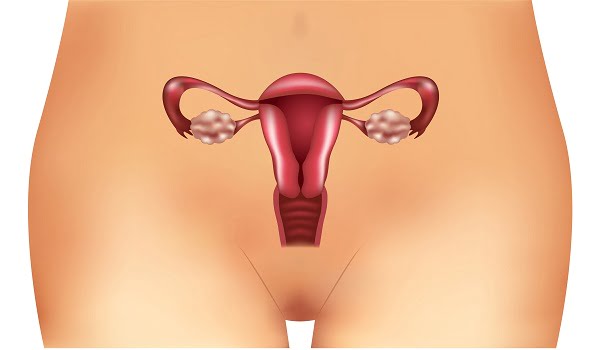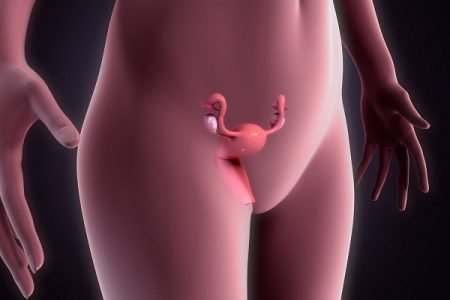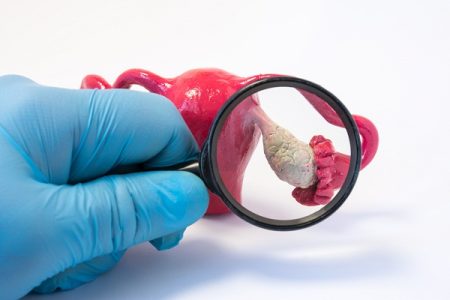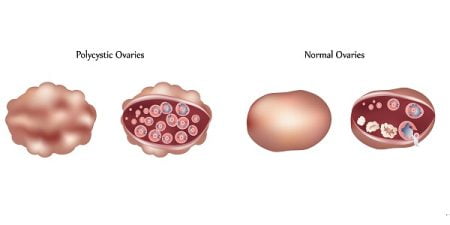
PCOS signs and symptoms
Polycystic ovary syndrome or PCOS is a hormonal disease common in women of reproductive age. Ovaries and adrenal glands produce a small amount androgen hormone in women along with estrogen and progesterone. High level of androgens has the capability to prevent ovulation and affect the menstrual cycle in women.
Many symptoms of PCOS are caused by high level of male hormones (androgens) present and circulating in the body. PCOS symptoms often develop around first menstrual period during puberty. Sometimes, PCOS signs may develop in later stages as a response to weight gain. Signs of polycystic ovary syndrome may vary from person to person. Diagnosis of PCOS is based on following three signs:
- No ovulation
- Cysts in ovaries
- Increased level of androgen hormone
No ovulation
The abnormally heavy period is a warning sign in PCOS. A woman suffering from PCOS has irregular or prolonged menstrual cycles which are the first signs of PCOS. Women may have less than nine periods in a year or may have the cycle length of 35 days (or more) if ovulation is not on time.
Cysts in ovaries
Ovaries of women suffering from PCOS might enlarge and may contain fluid-filled follicles. These follicles, in normal condition, release the egg during the menstrual cycle. As a result, the ovaries fail to function properly.
Increased androgen
Women suffering from PCOS have elevated level of male hormone, androgen in their body. As a result, excess facial hair and body hair grow. Severe acne and male-pattern baldness are other problems associated with it.
PCOS symptoms present in many different ways, and some women will have only some of them, or mild symptoms, whereas others will have severe symptoms. The symptoms and signs typically arise and become more severe if the person gains weight.
Following are the main symptoms of PCOS:
- period problem and irregular bleeding
- hair loss from the scalp
- hair growth on the face and body
- acne and oily skin
- fertility problems
- repeated miscarriages.
- insulin resistance and too much insulin
- upper body obesity and skin tags
- depression or mood swings
- breathing problems while
Period Problem
The period problem in PCOS is quite common. High level of androgen disrupts the monthly cycles of ovulation and menstruation.
The average menstrual cycle is 28 days with one ovulation but in PCOS it is somewhere between 21 and 35 days. Eight or less menstrual cycles in a year are a sign of PCOS. As menstrual cycles lengthen, ovulation may stop entirely or only occur occasionally. Some women with PCOS also experience heavier or lighter bleeding during their menstrual cycle.
Infertility
High level of male hormone and high insulin level affect menstrual cycle by preventing ovulation. This either completely stops menstruation or make it irregular. This makes it more difficult to conceive naturally and increases the risk of miscarriage. However, this does not mean that all women with PCOS are infertile.
With the aid of medical treatment, women with PCOS can have children. In addition, being overweight can increase fertility problem. Thus, it is very important to exercise regularly to maintain the healthy weight.
Hirutism
Excess of hair on the face and body due to the high level of androgen in women is another symptom of PCOS. The excess hair is thicker and darker in color. The growth pattern of hair in women suffering from PCOS is just like in males. In addition to the face, following are the body parts where hair growth is noticed:
- Chin
- Upper lips
- Chest
- Around nipples
- Lower abdomen
- Thighs
- Sideburn region
According to a research, about 60% of women suffering from PCOS have hirsutism. Women with ethnic groups from India, Sri Lanka and Mediterranean population are often prone to hirsutism.
Alopecia
Sometimes, in women with PCOS, high level of androgen causes thinning and loss of scalp hair. The baldness is male-pattern.
Acne
PCOS leads to high level of androgen which increases the size of oil-producing glands on the skin. This leads to acne. Though acne is quite common in young age, women with PCOS suffer from severe acne.
Psychological effects
About 29% of women with PCOS suffer from depression and anxiety disorders. When a woman copes with hair falling issues, weight changes, severe acne and fertility problems, it negatively affects her body image and self-confidence. This adds to anxiety and depression.
There may be some relation between hormones and PCOS. Not much research has been done on the topic of how PCOS affects mental wellness. Fertility problem can impact on your mood and may cause mood swings.
Delayed diagnosis of PCOS and other problems associated with PCOS can make the person feel discouraged and helpless. This makes it harder to take charge of own health and lifestyle.
Sleep apnea
Women with PCOS can develop other disorders like sleep apnea. The risk of sleep apnea increases with increase in weight. It occurs when upper airway is blocked during sleep. Excessive fatty tissue in the neck can partially block the airway which leads to loss of sleep, fatigue and tiredness.






